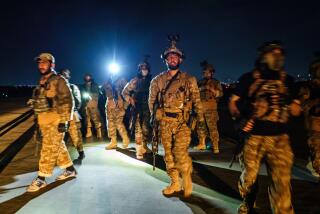Afghan district far from secure despite offensive to rout Taliban
- Share via
Reporting from Kabul, Afghanistan, and San Diego -- Security for Afghan villagers remains precarious in the Marja district of Helmand province, where U.S. Marines and Afghan soldiers mounted a massive assault in February to oust the Taliban from control, according to the Marine general who led the assault.
Brig. Gen. Larry Nicholson said late Sunday that while there are hopeful signs in Marja, with Afghan police patrolling and farmers signing up to grow crops other than opium poppy, the mission’s success or failure may not be known for months.
“It’s still a fragile security situation,” Nicholson said in a telephone interview from Camp Leatherneck just hours before relinquishing command Monday after a year of being in charge of all Marines in Afghanistan. “I think we’re off to a good start.”
Two Marine battalions, about 2,000 troops, remain in Marja along with Afghan security forces. But insurgents continue to plant roadside bombs in hopes of killing Marines. At night, Taliban fighters intimidate civilians by visiting their homes.
Helmand Gov. Gulab Mangal, speaking after Nicholson, said Taliban fighters were “using the local civilians as targets. It is very important that we take care of the local civilians.”
Villagers interviewed separately told of feeling hemmed in by insurgents and their homemade bombs, six weeks after the main fighting of the offensive ended.
“No one can move about freely. There is no security,” said Marja tribal elder Sultan Mohammad Shah, 64. “The Taliban are killing and beating people, and no one knows what is going on the next block over because they cannot go anywhere.”
He and others said promised government services have been slow to materialize. “If the situation remains like this, people will leave Marja,” Shah said.
The head of the district’s education department, Ewar Khan, said teachers and students alike were under threat.
For the battle of Marja to influence the overall struggle for control of Afghanistan, the U.S. and Afghan governments will have to move quickly to improve the lot of its citizens, officials have long acknowledged.
“Right now, it’s pretty thin,” Nicholson said of the government presence in Marja. “We need to do more.”
More to Read
Sign up for Essential California
The most important California stories and recommendations in your inbox every morning.
You may occasionally receive promotional content from the Los Angeles Times.













